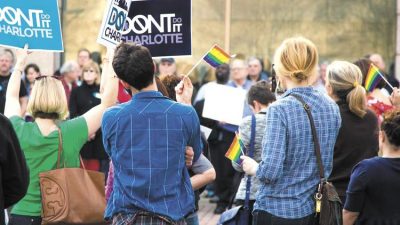C. Robert Harmon
By
Tom Arms
Alan Turing and Oscar Wilde are dancing a jig somewhere in the hereafter. These historical icons of the British gay community were outrageously persecuted by the British Establishment during their lifetimes.
Now the British Foreign Office—one of the traditional apexes of the social hierarchy–is riding to the rescue of any member of Britain’s lesbian, gay, bisexual and transgender communities who dares to wander through the American South.
The cause for the spectral celebration is the recently posted note on the FCO’s travel advisory web site: LGBTS should steer clear of Mississippi and North Carolina, for in those states bigots do dwell.
As far as Mississippi is concerned they may have a point. The state legislature there has recently passed a law giving businesses the right to refuse to serve gay couples on religious grounds. But In North Carolina the situation is a bit murkier and highlights a growing international problem of conflict between cities and their hinterlands.
The North Carolina law that has upset so many is House Bill Two, or just HB2. It is a reaction to a city ordnance passed by Charlotte—the state’s largest and fastest growing metropolitan area. In the spirit of political correctness, the city fathers decided to allow the LGBTs to use whichever toilet facility they prefer. The rest of Bible Belt North Carolina was shocked and appalled and the state legislature quickly overrode the city ordnance with the passage of HB2 which says everyone must use the rest room of their birth sex.
Cities have always attracted minorities. It’s tough being the only gay, Jew, Catholic, Asian, Hispanic, Black or even White in a small community. Much better to migrate to the city where you can join hundreds – perhaps thousands—of likeminded souls whatever your gender persuasion, religion, race or ethnic background.
Out of social necessity, cities have traditionally bred tolerance. Relative to the hinterlands in which they sit they are seas of liberality; although the denizens of the countryside may prefer the phrase cesspits of corruption and sexual license.
This conflict has existed for centuries, and according to a UN report, is set to worsen. In 2014, 54 percent of the world’s population were urbanites. By 2050, the figure will be 66 percent.
And it is not just sex that attracts them. The biggest magnet is money and the plethora of opportunities to make it. Cities drain the surrounding countryside of the best and brightest determined to test their wits against each other in the most lucrative business battles. Cities are exciting.
Charlotte, with its population of 800,000-plus is the second largest in the Southeastern United States. The World Cities Research Network has classified it as a “global city”. However, it is not what is termed a “mega city”. London, Paris, New York and Shanghai, are all not so much cities as they are city states with their own economies which dwarf entire countries.
If New York was an independent country it would be either the 12th or 13th largest economy in the world. The GDP of Paris is five percent of the total Gross Domestic Product of Europe. London’s economy grows at twice the rate of the rest of the United Kingdom. Shanghai’s income per head is $23,000 compared to $7,600 for China as a whole.
Megacities have more in common with each other than they do with the populations of the countries in which they are located. Today’s West End production is tomorrow’s Broadway hit. International bankers, lawyers and businessmen flow seamlessly from one metropolis to the next. They eat in the same sushi bars and drink the same coffee. They even read the same newspapers.
But the bulk of their laws—as Charlotte discovered—are controlled by legislators whose non-urban representation still outnumbers that of the mega cities or the aspiring second tier global cities. The urban entities are economic giants but political dwarves. As long as this remains the case Charlotte, must share the bigot brand with the rest of North Carolina.
Tom Arms broadcasts on world affairs for a number of US radio stations including WTKF at http://www.wtkf107.com/. His Weekly Viewpoints discussion programme can be heard at 1830 EST on Wednesdays and his LookAhead at the next week’s main events on Fridays at 1800.
LookAhead Radio World Report for week commencing 25th April:



No Comments Yet!
You can be first to comment this post!